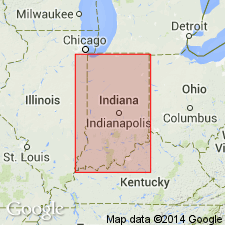
- Usage in publication:
-
- Ditney Coal Member
- Modifications:
-
- Reference
- AAPG geologic province:
-
- Illinois basin
Summary:
Pg. 48-49 (article by C.E. Wier). Ditney Coal Member of Patoka Formation. Banded partly shaly coal, generally less than a foot thick. Separated from underlying West Franklin Limestone Member by 1 to 20 feet of unnamed gray shale and underclay. Northernmost exposure in northwestern Vigo County, Indiana. Exposures not continuous in Vanderburgh and Gibson Counties, Indiana, where it either was not deposited or underwent erosional cutout by the overlying Inglefield Sandstone Member of Patoka. Equivalent to Chapel (No. 8) coal [in Modesto Formation] in Illinois (Wier, in prep.) [see also Kosanke and others, 1960, pl. 1]. Rocks of †Ditney Formation (of Fuller and Ashley, 1902, p. 2), reallocated to Patoka Formation; name is retained for coal member.
Type area: Ditney Hills, in secs. 4, 5, and 6, T. 5 S., R. 9 W., Warrick Co., IN (Fuller and Ashley, 1902, p. 2).
Reference section: north side of Evansville, in NW/4 SW/4 sec. 13, T. 6 S., R. 11 W., Vanderburgh Co., IN.
Wier (in prep.) [= Stratigraphy of the Carbondale and McLeansboro Groups in southwestern Indiana, Indiana Geol. Survey Bull. XX, 171 p., unpub. ms., ca. 1961; available online through Indiana Univ. Scholarworks http://hdl.handle.net/2022/3612, accessed on September 18, 2009]
Source: Publication.
For more information, please contact Nancy Stamm, Geologic Names Committee Secretary.
Asterisk (*) indicates published by U.S. Geological Survey authors.
"No current usage" (†) implies that a name has been abandoned or has fallen into disuse. Former usage and, if known, replacement name given in parentheses ( ).
Slash (/) indicates name conflicts with nomenclatural guidelines (CSN, 1933; ACSN, 1961, 1970; NACSN, 1983, 2005, 2021). May be explained within brackets ([ ]).

